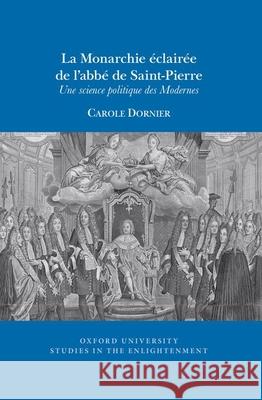La Monarchie éclairée de l’abbé de Saint-Pierre: Une science politique des Modernes » książka
La Monarchie éclairée de l’abbé de Saint-Pierre: Une science politique des Modernes
ISBN-13: 9781789622225 / Francuski / Miękka / 2021 / 461 str.
L’abbé de Saint-Pierre, connu pour son Projet de paix perpétuelle, a laissé un ensemble bien plus vaste et cohérent d’écrits politiques et moraux jusqu’alors dispersés et partiellement étudiés. Le présent ouvrage, exploitant systématiquement la totalité de l’oeuvre, en propose la complète réévaluation. Dès les premières décennies du XVIIIe siècle, Saint-Pierre promeut une harmonisation artificielle des intérêts, assurée par l’intervention politique et s’affirme, avant Bentham, comme l’un des premiers utilitaristes. Il imagine de substituer à la patrimonialisation, aux recommandations et clientèles qui structuraient la société de son temps et déterminaient l’exercice du pouvoir, une organisation rationnelle, méritocratique et dynamique. ll remplace les valeurs charismatiques fondant la perfection chrétienne ou la grandeur aristocratique par les objectifs de l’utilité et du bien public. Pour ce déiste conciliant moralité et religion, la recherche du salut par une piété active doit favoriser la justice et la bienfaisance. Selon lui, seul le pouvoir indivisible d’un monarque informé par des élites compétentes peut réaliser des réformes nécessaires au bonheur du plus grand nombre. Promoteur d’un État de bien-être imposé autoritairement, il représente, avant le plein essor de l’économie politique, des sciences camérales et de la doctrine des physiocrates, une dimension méconnue des Lumières politiques que cette étude entend souligner. --- The Abbé de Saint-Pierre, best known for his Project for Perpetual Peace, in fact left a much larger and more coherent body of political and moral writing, but it has been only partially studied. This book, the first systematic exploration of his entire corpus, offers a complete re-evaluation of this important author’s contributions to the Enlightenment. From the first decades of the 18th century, Saint-Pierre set forth a pioneering vision of politics as the harmonization of interests, anticipating Bentham as a utilitarian. He imagines replacing the system of inherited power and clientele networks which structured Old Regime society and determined the exercise of power under absolutism, with a rationalized, meritocratic and dynamic organization. He argued for the political values of social utility and public good to take the place of the Christian ideals of perfection and the aristocratic ideals of personal charisma. As a deist seeking to reconcile morality and religion, Saint-Pierre argued that the search for salvation through active piety must also promote social justice and beneficence -- and that only the indivisible power of a rationalized monarch, informed by competent elites, could carry out the reforms necessary to yield a government which would produce the greatest happiness for the greatest number. Saint-Pierre, thus, provided among the first arguments for an imposed welfare state, well before the sources more frequently associated with that idea -- political economists, cameralists and the physiocrats.











